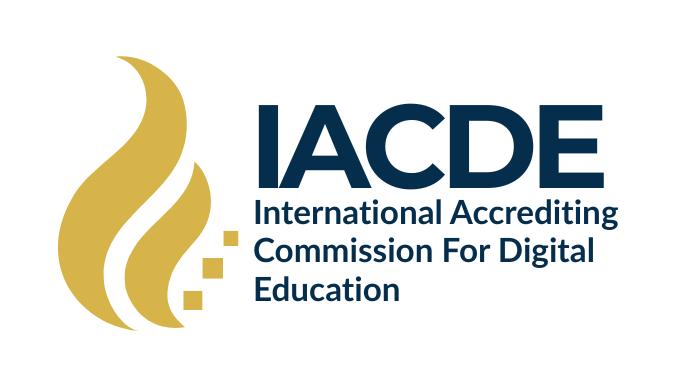“Ethics is not an act—it is the foundation upon which trust, integrity, and excellence in accreditation are built.”
— IACDE
Code of Ethics
Background
The International Accrediting Commission for Digital Education (IACDE) is committed to maintaining the highest standards of professional ethics, transparency, and integrity in all accreditation activities. This Code of Ethics defines the values and behaviors expected of all individuals and institutions associated with IACDE.
The purpose of this Code is to:
• Safeguard the integrity of the accreditation process.
• Promote ethical conduct and professionalism.
• Ensure fair, unbiased, and transparent evaluation practices.
• Strengthen public confidence in digital education accreditation.
Core Ethical Principles
• Integrity and honesty in all professional conduct.
• Independence and impartiality in judgment.
• Accountability and transparency in decision-making.
• Respect for diversity, culture, and institutional context.
• Commitment to confidentiality and data protection.
• Continuous improvement and self-reflection in ethical practice.
Applicability
This Code applies to:
• IACDE Commissioners, officers, employees, and contractors.
• Peer reviewers and evaluation team members.
• Representatives of institutions seeking or maintaining accreditation.
• Partners and affiliates engaged in IACDE-endorsed activities.
All parties must uphold this Code as a condition of continued affiliation or recognition.
Ethical Standards
1. Integrity and Honesty
• Act truthfully and in good faith at all times.
• Avoid any form of deception, manipulation, or conflict of interest.
• Report unethical behavior or violations to IACDE promptly.
2. Independence and Objectivity
• Evaluate institutions solely on evidence and published standards.
• Maintain independence from personal, financial, or institutional bias.
• Disclose any potential conflict prior to review or service.
3. Confidentiality
• Protect institutional information obtained during accreditation.
• Use confidential data only for legitimate accreditation purposes.
• Comply with IACDE’s Confidentiality and Data Protection Policy.
4. Fairness and Non-Discrimination
• Treat all institutions and individuals equitably and with respect.
• Refrain from discrimination based on nationality, faith, gender, or affiliation.
• Apply IACDE standards consistently across all regions and modalities.
5. Professional Competence
• Accept assignments only within areas of expertise.
• Prepare adequately for all reviews and responsibilities.
• Maintain current knowledge of standards, ethics, and best practices.
6. Transparency and Accountability
• Communicate decisions clearly and in accordance with IACDE policy.
• Disclose accreditation outcomes accurately and without bias.
• Correct any public misrepresentation of IACDE actions or status.
7. Conflicts of Interest
• Avoid roles, relationships, or benefits that could compromise neutrality.
• Refrain from reviewing institutions where past or future employment may arise.
• Seek guidance from IACDE’s Ethics Office when in doubt.
8. Use of IACDE Name, Logo, and Credentials
• Represent affiliation truthfully and only as authorized.
• Do not imply endorsement beyond the accreditation granted.
• Cease all use of marks immediately upon termination or withdrawal of recognition.
9. Responsibility to Report Misconduct
• Individuals and institutions are obligated to report known or suspected misconduct.
• Retaliation against those who report in good faith is strictly prohibited.
Peer Reviewer Conduct
• Remain neutral, objective, and respectful throughout all reviews.
• Avoid personal commentary on institutional leadership or staff.
• Keep all deliberations confidential and destroy draft notes after submission.
Institutional Responsibilities
• Provide complete, accurate, and truthful information to IACDE.
• Notify IACDE promptly of material changes affecting quality or compliance.
• Avoid attempts to influence or pressure reviewers or Commissioners.
Reporting and Enforcement
Violations of this Code may be reported to ethics@iacde.org.
IACDE investigates all allegations promptly and confidentially.
Possible outcomes include:
• Advisory or educational letter.
• Written warning or corrective plan.
• Removal from reviewer roles or denial of institutional recognition.
• Referral to the Commission for disciplinary or accreditation action.
Governance and Review
This Code is reviewed annually by the Policy & Standards Committee.
Revisions are published on the IACDE website, and all affiliated members are notified.
International Accrediting Commission for Digital Education (IACDE)
8206 Louisiana Blvd NE Ste B #10025, Albuquerque, NM 87113, USA
info@iacde.org | www.iacde.org
“Your Mission Deserves Accreditation Without Barriers.”
Policy Adoption Record
Adopted by the International Accrediting Commission for Digital Education: 06/2025
Revised: 10/2025
Editorial Revision: 10/2025

